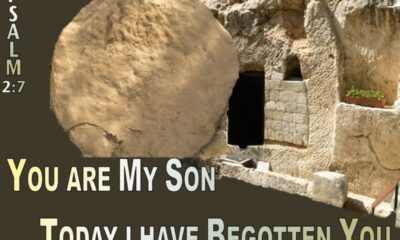The Radical Call For Jesus
The Radical Call For Jesus
Twenty Ninth Sunday in Ordinary Time (Year B)
Isa 53.10-11; Ps 32; Heb 4.14-16; Mk 10.35-45
1. Colin Cunningham once said, “Be careful what you wish for because you will get it. Be even more careful what you work for because you will get it even more quickly.” How foolish the Sons of Zebedee were! How completely wrong they were about the nature of their vocation.
Christ had called them to follow Him, and all they could think about was having thrones of glory. They wanted the reward of faithful discipleship, without apparently giving much thought to the cost involved – the cost of suffering, the price of discipleship, the price of the priesthood. The Master asks them if they can endure what He will have to endure, and they boldly claim that they can.
2. I dare say that many a priest, on the day of his ordination, has generously promised the Lord to suffer gladly with Him, for His sake, and the sake of the flock that will be entrusted to his pastoral care. Such promises, rash and idealistic as they might seem, are actually the stuff of which authentic vocations are built on.
Nowadays, we perhaps lose sight of the element of suffering that is inherent in any genuine vocation to the sacred ministry. I mean, innocent suffering. I do not of course mean the just punishments which priests incur who betray their calling, who abuse their position, and even, God forbid, abuse their flock in some way.
That kind of betrayal naturally fills us with horror. No, I mean what can perhaps be called the ordinary, everyday suffering which being a priest must always involve.
3. Priests are primarily men of sacrifice. They are ordained, among other reasons, to offer the sacrifice of the Mass, the sacrifice of Christ on Calvary, the sacrifice of the altar. They are ordained to offer, day in and day out, the atoning sacrifice by which Our Saviour reconciled us to the Father, and opened up for us the gates of heaven.
The sacrifice of Calvary and the sacrifice of the altar are numerically one identical same event. Only the mode of offering is different. Priests are men of sacrifice. Sacrifice is their business. This means that in their personal lives, priests should be as closely conformed as possible to Christ, Whose sacrifice they re-present as they stand at His altars. Like Christ, priests’ lives should be a daily offering of love and sorrow, in union with the Redeemer, to God the Father.
The identification of a priest with the Lord means being willing to suffer, innocently, for the love of Him, and to offer those sufferings for the people. Now in case some of you are thinking that this is all rather too high-minded and unrealistic, let me say that of course, of course, we know that we all fail, often. Many are the times when, like the glory-seeking sons of Zebedee, we approach Christ hoping for some sort of reward, rather than hoping for a share in His Cross, a share in his death.
4. What are the sufferings that come our way, those of us whom the Lord has called to the priesthood? Many could be described! Let me mention just two. Much of a priest’s work is done in what is called the ‘internal forum’, either sacramentally, in confession, or in the total confidence which much priestly work demands.
This forum of secrecy and confidentiality means that most of what we do has to remain completely secret, a secret between us and the Lord. Priests might chat about their daily tasks, but rarely about their actual work. They can’t. Much of what they do is sealed by the seal of the confessional. So we can never really speak about some of the most important aspects of our work, except in the most veiled and general terms.
This is why much of the time we have to be so deliberately non-committal. Gossiping with parishioners, or about parishioners, whose confessions one has heard, or whose secrets one has shared, is absolutely out of the question. A prudent habit of silence and discretion is therefore always required of any priest.
5. Another area of mortification is of course the fact that priests rarely, if ever, see the end-results of their work. How many times has one given absolution, or holy communion, to one’s people. But in those actions, the workings of grace, the fruits of those sacramental gifts, are something known to God alone.
To cope with this, hardly ever seeing the fruits of what the Lord does through us, this requires a high level of trust in divine providence and a humble willingness to be simply one step in a process whose end-product we rarely see. It would be fatal for any priest to try and judge the success of his work, success that is in the terms that the Lord reckons these things. You might be able to judge the success, in material terms, of a new mission house, a Church building, or a new hall.
But in the things that really matter, the salvation of souls, we have to be content to do the Lord’s work as best we can, and leave the results to Him. The final results of a priest’s work will be known only on the day of judgement, but on that day most of us will be so busy blushing and squirming, that we probably won’t have much time to listen in on the secrets of other souls. Hearing the secrets of our own souls announced to the entire universe will be quite enough to occupy our thoughts!
6. One of the joys of heaven will be to understand better the heights and depths of God’s mercies. There we shall know as we are known. We shall know in detail the full extent of how our souls and other souls were saved, how they sinned, and were forgiven; how they sinned again, and were forgiven again.
We shall see it all with total clarity. We shall know how the prayers of Our Lady and all the saints influenced our journey to paradise. We shall know how the silent sufferings and self-sacrifices of our friends and neighbours contributed to our own spiritual health. We might even find out, if we’re lucky, just how Father’s funny little homilies and strange little silences all had their part to play in our growth in holiness. All will be revealed. All will be made clear. All will be understood. In the meantime, in this vale of tears, we have to learn to suffer in silence.
In heaven, the silences of earth will be replaced by the sound of the everlasting fountain – God’s goodness, truth and beauty – being endlessly poured out for our delight. That, when we finally come to it, will be something well worth talking about. And by then, it will no longer be a secret.
OSHO































